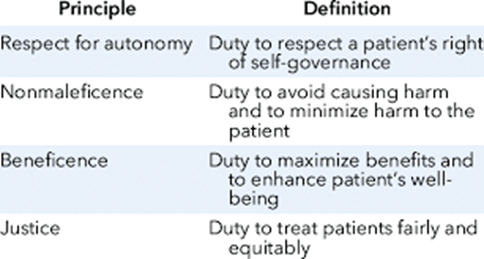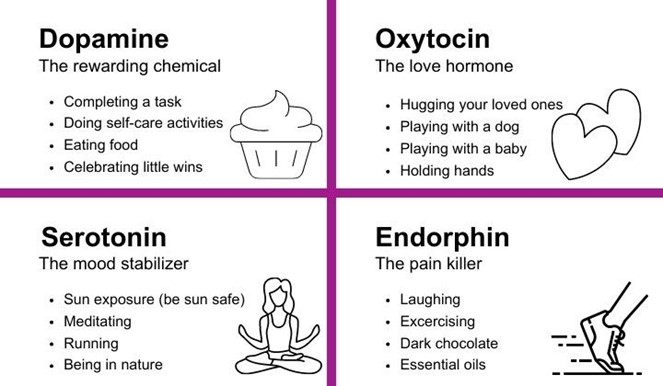A nurse manager is reviewing clients' rights with the nurses on the unit. The nurse manager should tell the nurses that informed consent promotes which of the following ethical principles?
Autonomy
Nonmaleficence
Justice
Fidelity
The Correct Answer is A
A. Autonomy is the ethical principle that respects the right of clients to make their own decisions and choices regarding their health care. Informed consent is a process that ensures that clients are fully informed of the benefits, risks, alternatives, and consequences of a proposed treatment or procedure, and that they voluntarily agree to it.
B. Nonmaleficence is the ethical principle that obliges health care providers to do no harm to clients, either intentionally or unintentionally. Informed consent does not directly promote this principle, although it may help to prevent harm by disclosing potential risks and complications.
C. Justice is the ethical principle that requires fair and equal treatment of all clients, regardless of their personal characteristics, preferences, or values. Informed consent does not directly promote this principle, although it may help to ensure that clients are not coerced or manipulated into accepting a treatment or procedure that they do not want or need.
D. Fidelity is the ethical principle that requires health care providers to be faithful and loyal to their clients, and to honor their commitments and promises. Informed consent does not directly promote this principle, although it may help to establish trust and rapport between clients and providers.

Nursing Test Bank
Naxlex Comprehensive Predictor Exams
Related Questions
Correct Answer is A
Explanation
- Cocaine is a powerfully addictive stimulant drug that increases the levels of dopamine in the brain, which is a chemical messenger related to movement, pleasure, and motivation.
- Cocaine's effects appear almost immediately and last for a few minutes to an hour, depending on the method of use. Some of the short-term effects of cocaine include extreme happiness and energy, mental alertness, hypersensitivity to sight, sound, and touch, and irritability.
- An elevated energy level is one of the most common and noticeable effects of cocaine use, as cocaine stimulates the central nervous system and makes the user feel more alert, active, and confident¹². This effect may also lead to increased physical activity, talkativeness, or aggression.
Therefore, option A is the correct answer, while options B, C, and D are incorrect.
Option B is incorrect because a powerful craving for more cocaine is not a behavior that can be observed by others, but rather an internal feeling that the user may experience due to the addictive nature of the drug.
Option C is incorrect because high self-esteem is not a typical effect of cocaine use, as cocaine may cause paranoia or anxiety in some users.
Option D is incorrect because euphoria is not a behavior that can be observed by others, but rather an emotional state that the user may feel due to the increased dopamine levels in the brain

Correct Answer is C
Explanation
a. Administer the medication and alert the charge nurse: This choice suggests proceeding with medication administration but also informing the charge nurse. While it's important to communicate with the charge nurse regarding medication administration, in this scenario, there is no indication to hold the medication as the infant's heart rate is within the normal range. Therefore, alerting the charge nurse may not be necessary at this point.
b. Hold the medication and document cardiac assessment: This choice suggests holding the medication and documenting the cardiac assessment. However, since the infant's heart rate is within the normal range for their age, there is no clinical indication to hold the medication. Holding the medication unnecessarily could delay treatment and potentially lead to adverse outcomes if the medication is needed.
c. Administer the medication and document the heart rate.
Since the infant's heart rate of 120 beats per minute falls within the normal range for a 2-month-old, there is no indication to hold the medication. Administering the digoxin as prescribed and documenting the heart rate before administration are appropriate actions. It's important to ensure accurate documentation to track the infant's response to the medication and monitor for any changes in heart rate.
d. Hold the medication and recheck the heart rate in 1 hour: This choice suggests holding the medication and rechecking the heart rate in 1 hour. Again, since the infant's heart rate is within the normal range, there is no clinical indication to hold the medication or delay treatment. Rechecking the heart rate in 1 hour would be unnecessary and could potentially delay necessary medication administration.
Whether you are a student looking to ace your exams or a practicing nurse seeking to enhance your expertise , our nursing education contents will empower you with the confidence and competence to make a difference in the lives of patients and become a respected leader in the healthcare field.
Visit Naxlex, invest in your future and unlock endless possibilities with our unparalleled nursing education contents today
Report Wrong Answer on the Current Question
Do you disagree with the answer? If yes, what is your expected answer? Explain.
Kindly be descriptive with the issue you are facing.
